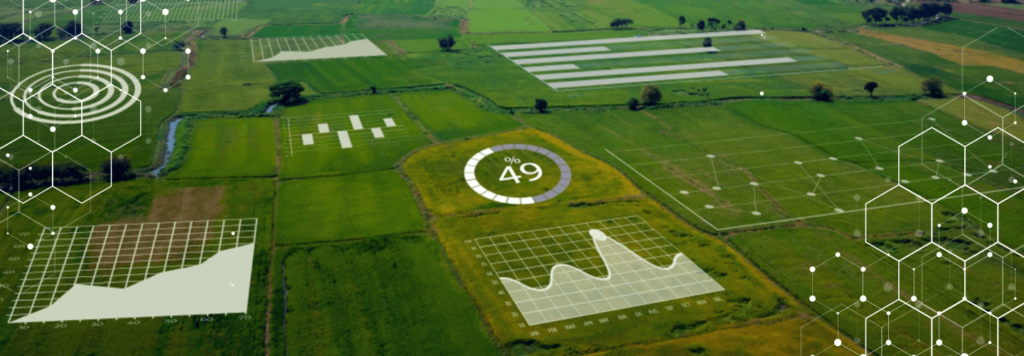Improvements in AgTech: Sowing the Seeds of Next Agricultural Revolution

Much like the global energy transition, we believe the world is now entering into a food transition. Seismic tailwinds such as massive demographic changes are influencing consumer food preferences and significant advances in the technologies of food production are majorly propelling this transition.
In recent times, the agriculture industry has been subject to numerous technological advances for efficient food production. All these tools fall under the broad category of Agriculture Technology, better known as AgTech, which implies the application of technology to farming.
Why is Technology Important to the Future of Agriculture?
Today, increasing global agricultural production is becoming a necessity as the demographic, social, and climatic dynamics continue to change. The rapidly growing world population, high rates of urbanisation, and rising incomes in various parts of the globe are further likely to boost food demand.
Improper forms of cultivation practised over the years have degraded one-fourth of the agricultural land and the restoration of its vegetative capacity would require a huge amount of investment. Consequently, the expansion of crop acreage would involve deforestation which would only intensify global warming. Yields are further affected by changing climate and weather patterns resulting in prolonged periods of droughts and torrential downpours causing floods.
While the agricultural industry accounts for 70% of the global water consumption, a quarter of agricultural water is used in raising livestock for slaughter which further causes 18% of global greenhouse gas emissions.
Based on the demographic forecasts, the world should produce about 50% more food than it produces today by 2025. This is unlikely to be achieved by intensifying conventional farming methods. Therefore, farmers need to take advantage of new technologies, digital solutions, and improvements in agritech to revolutionise the way crops are grown.
How has Technology Changed Farming?
Human intelligence along with scientific breakthroughs and technological advances have provided the world with a plethora of tools to transform the global food systems and mitigate its impact on the environment. Precision agriculture, for instance, enables weather forecasting in real time that helps farmers make day-to-day decisions pertaining to irrigation as well as fertiliser and pesticide application.
Controlled-environment agriculture or greenhouses are completely automated and run by algorithms that adjust inputs such as heating and roof ventilation to provide optimal conditions for crop growth. This further reduces the impact on the climate while improving operational efficiency and productivity.
Different types of cameras such as multispectral cameras installed on modern farm machinery and equipment enable ultra-high resolution imaging that can spot early signs of disease or pest attacks, soil degradation, and water stress. Drones are also increasingly used to accurately spray water, fertilisers, and pesticides. Smart agriculture reduces the guesswork in farming and enables crops to reach their full growth potential using less amount of chemicals.
Three Technologies Propelling the Progress of Agriculture
In recent times, improvements in agtech have revolutionised the farming industry, allowing farmers to better utilise their land, resources, and labour to optimise production.
- Vertical Farming Proving to be a Fertile Ground for Growth
New sensor-equipped gadgets and applications are helping various farmers to shift from the fields to indoor food-growing operations. The rise of tech-driven agriculture, the high popularity of organic food, and the ease of monitoring and harvesting are boosting the adoption of indoor vertical farming or hydroponics farming.
Automation is emerging as a key area in vertical farming to address the existing challenges such as large manual labour requirements and high maintenance and running costs. Vertical farms today use extensive sensor networks for crop monitoring and growing systems that help operators efficiently identify problems and optimise their workflow.
- Drones, Robots, and Autonomous Machines Take the Center Stage
New digital technologies such as drones, agrobots, and autonomous tractors quickly monitor irrigation systems and farmland properties and gather data in real-time. These advancements enable farmers to increase their crop yield while cutting heavy maintenance costs.
Digital agricultural technologies are integrated systems that allow the combination of each tool or equipment to make the work in the field more efficient, faster, and simpler. With drones and autonomous machines, farmers need to go out in the field to check the conditions of crops, thus reducing high workforce requirements.
- Precision Agriculture Technologies to Safeguard the Right Parameters
Precision agriculture technologies refer to tools and machines that farmers use to optimise land productivity. Sensors are one of the most important tools in precision agriculture. The recent use of different types of sensors is taking farming to a new level.
Today, farms including vertical farms are equipped with sensors, making it possible for farmers to monitor them in a very convenient way. Sophisticated sensors are installed in farms and machines to determine soil parameters, grow crops under controlled environments, and improve the entire harvesting process.
The Future of Agritech
Agritech is expected to become ‘the next best thing’ in the world of agriculture. Technology is replacing farmers’ and growers’ guesswork by providing lots of data, enabling the analysis of moisture content, pH levels, and other parameters relevant to crop quality. With significant improvements in agtech, it looks like many crops will be unmanned, and large physical human labour will no longer be needed on farms in the near future.
The first and foremost step, following a digital transformation in farming, is the adoption of a farm management system or software. Digititalisation is set to be at the heart of the next revolution in agriculture, with increasing data points emerging from all types of tools. Farm management software allows the analysis of this data to help farmers make informed decisions. FarmERP offers a wide range of agtech solutions to help you manage your agribusiness activities efficiently and produce high-quality yields. Contact us today to know more.
